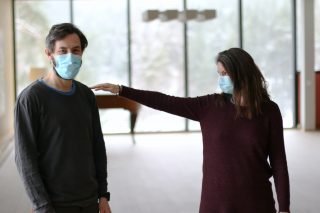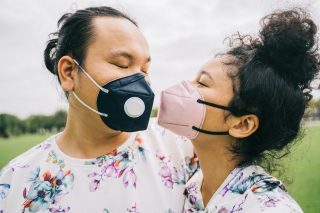One of the biggest concerns during the height of the pandemic, after lockdown regulations were passed, was the lack of physical contact that people would have to endure. Referred to as affection deprivation, scientists raised concerns about how lack of skin-to-skin contact could affect us both psychologically and physically – after all, the human touch is essential to our wellbeing.
However, even now, a year after the coronavirus was declared a pandemic, people are still shying away from hugging. If that’s not enough, it also appears that they may even be shying away from having sex.
Has COVID-19 ruined your sex life?
“Sex is vital to feeling alive” explains psychosexual therapist Silva Neves. “It is psychologically a major component of our excitement and zest for life. Sex is imperative to self-connection”.

Photo by Chris Greene on Unsplash
Many assume that after being locked up for the better part of last year, people would be having lots of sex. Yet, this couldn’t be further from the truth. In fact, even for couples who were under lockdown together, their sex lives definitely took an unexpected hit.
What does the research say?
A recent study published in the Journal of Sex Research set out to examine the effects of lockdown restrictions on the sex lives of young UK adults.
For the study, researchers asked participants if they engaged in a list of sexual activities both before lockdown and during lockdown. This included intercourse, solo masturbation, and watching pornography. They were also asked to rate their health and wellbeing.
The findings revealed that 25.5% of respondents stopped having sex with their partner during the lockdown. It also found that a third of people had less sex with their partner, a quarter masturbated alone less, and around a fifth (22%) watched less pornography alone.
The study also looked at sexual desire and found that women reported lower sexual desire than men overall, with a significant decrease in sexual desire during lockdown compared with before lockdown.
Considering the fact that research has proven that women are more affected by pandemics, this may explain the decrease in their sexual desire and the negative effect on wellbeing.
Bye-bye sex drive

Photo by We-Vibe WOW Tech on Unsplash
A separate study, courtesy of the Kinsey Institute, found that many felt that the pandemic had affected their intimacy, keeping them from getting in the mood.
For the study, researchers surveyed 1,559 adults last year, just after the pandemic broke out. They found that 43.5% of participants reported a decline in the quality of their sex life while only 13.6% claimed it had improved.
“The widespread social restrictions put in place during the COVID-19 pandemic appear to have significantly disrupted sexual routines and the overall quality of people’s sex lives,” the study concluded.
That said, it’s not just one-on-one touching that’s taken a bit of a dip.
The dip in solo time
Sextech company Lioness did its own study, analyzing an in-depth dataset capturing how people’s sex lives and drives were impacted by the pandemic.
Using anonymous data taken from 1 879 Lioness users who opted into participation, the researchers analyzed their arousal responses during approximately 40 000 sessions with the Lioness Vibrator between 2019 and 2020.
The study found “convincing evidence of a significant drop-off in masturbation frequency as the year wore on when compared to [those same users’] masturbation frequency back in 2019,”. Overall, there was a roughly 9% month-to-month drop-in sessions from last year, with the most significant decline happening in 2020 during the final months of the year, with November’s use dropping more than 37%.
How exactly is COVID-19 affecting your sex life?
There are a few ways that a pandemic can disrupt your flow and get you out of the mood.

Photo by Gustavo Fring from Pexels
1. Collective trauma
Collective trauma is an event that psychotically affects a group of people of any size, up to and including an entire society. This could include the long-standing effects of racism, colonialism, and, yes, a global pandemic.
So, people are having to deal with the effects of the pandemic, on a psychological and physiologic level, so it’s no wonder that they’re not in the mood to have some one-on-one time.
2. Your habits have changed
As much as we tried, our eating habits weren’t exactly the best during the lockdown period. This not only affected our weight (hello lockdown pounds) but it also affected our sex life – especially when you remember that a poor diet can hurt your sex life.
It’s not only our eating habits that changed while we were stuck indoors as many people had trouble sleeping. not using your bed for sleep is sure to affect your sex life.
3. You’re drinking or smoking more
We’re all looking for coping mechanisms to deal with the trauma that was 2020. Unfortunately, many looked to the bottom of a wine glass, or a box of cigarettes, to cope with the stressors of the past year.
Not only can smoking affect both sexual desire and performance, but alcohol has also been found to affect vaginal lubrication and affect a woman’s ability to achieve an orgasm (1).

Photo by Mahrael Boutros from Pexels
If you’re having trouble managing the stressors in your life, why don’t you take a page out of Kevin Hart’s book and try mindfulness?
4. You’re seeing more of your partner
You’re only miss something when it’s gone. It’s kind of hard to miss something if you keep seeing it all day. In fact, those adorable quirks you love so much soon turn into incessant irritations (did they always chew this loud?)
Not to mention that some couples have also had to deal with their kids at home, chances are you have no desire to spend some intimate time with your partner – especially since it was their turn to do the dishes, and they conveniently forgot.
5. Erectile dysfunction and COVID-19
You read that right. It appears that one of the effects of contracting the coronavirus is that you’ll have some trouble in the bedroom.
The study, published in the Journal of Endocrinological Investigations, found that COVID-19 survivors may experience short and long-term sexual and reproductive health issues, including erectile dysfunction (ED). As COVID-19 has been detected in the testicle, this could explain why it could affect both sperm production and testosterone production.
That said, researchers are unsure of the exact link between COVID-19 and ED, but they have a few theories;
Underlying health issues
As we know, COVID-19 can exacerbate an already existing health issue and erectile dysfunction is often a symptom of an underlying health problem.

Photo by Anna Tarazevich from Pexels
Mental health
According to a study published in the Lancet Psychiatry journal, a third of COVID survivors suffer from neurological or mental disorders, and studies have indicated that poor mental health can cause ED.
Poor blood circulation
Dr. Judson Brandeis is a urologist and an expert in men’s sexual medicine. Speaking to MedicalXpress, he shared how poor blood circulation can affect erectile function.
”Erectile function is highly dependent on pressurized blood flow, which starts at the heart, pulses through the large arteries, and then flows through the small blood vessels. Conditions like diabetes, high cholesterol, and smoking cause damage to the inner lining of the blood vessels, which causes ED. So does COVID-19.”
Affects the testicles
A separate study published in The World Journal of Men’s Health found that the coronavirus can invade tissues in the testicles in some men. As the testicles are where the majority of testosterone is produced, the invasion of the virus can affect production, which in turn, can contribute to erectile dysfunction.
How can I improve my pandemic sex life?
1. Ask each other about your day

Photo by RODNAE Productions from Pexels
For those still working from home with their partners, checking in on them can help ease any tension and even allow them to share their intimate feelings.
2. Do something non-sexual together
Reading a book, listening to music, or even watching a documentary together will allow you to spend quality time together.
3. Be affectionate with each other
Skin-on-skin contact is important and not every touch has to be sexual.
Think hugging, foot massages, cuddling, back scratches, holding hands, and head rubs.
4. Schedule sex
It may not sound romantic but sometimes you and your partner aren’t in sync, and you need to do what you need to do. Besides, planning for your next romp can ease off the pressure and allow for the excitement to build up.
A study was done for the book Magnificent Sex: Lessons from Extraordinary Lovers and it found that the components of great sex ignored notions of romantic spontaneity and, instead, embraced deliberateness and making a plan.
5. Talk about it
Communication in any relationship is key. If you’re struggling with getting in the mood, or you’re upset that they’re not giving you what you need, then you need to speak and let your partner know.

Photo by Anna Tarazevich from Pexels
Want to know more?
Another factor that could be affecting your sex life that penises are shrinking. According to research, high pollution levels are causing penises to shrink and sperm counts to drop by 60%.



![women [longevity live]](https://longevitylive.com/wp-content/uploads/2020/01/photo-of-women-walking-down-the-street-1116984-100x100.jpg)










